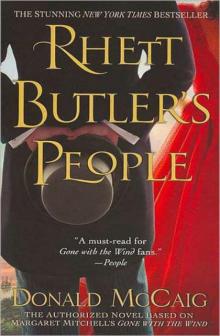- Home
- Donald McCaig
Ruth’s Journey Page 3
Ruth’s Journey Read online
Page 3
Two frigates sailed out into a beautiful day on the bay, and at low tide, three mornings later, the wide white beach was littered with drowned Negroes. The flat, metallic smell of death set Solange to gasping. When Solange complained to Captain Fornier, his weary, tolerant smile was a stranger’s. “What else would you have us do with them, madame?”
For the first time, Solange was afraid of her husband.
* * *
The morning everything changed, Solange awoke to Ruth humming and the piquant odor of coffee.
Solange pushed the shutters open on a dejected straggle of soldiers below. What day was it? Would Augustin come home today? Would the rebels mount their final attack?
Ruth said, “What does Madame wish?”
What indeed? How could she be so discontented without intending anything?
Solange touched the gold rim of her cobalt blue cup. These walls, the walls of her home, were brute unplastered stone. Shutters of some native wood were unpainted. Ruth’s eyes, like the delicate cup, were rich, complex, and beautiful. Solange said, “I have done nothing.”
Ruth might have said, “What ought you have done?” but she didn’t.
“Like a silly amateur sailor I have drifted into very deep water.”
Ruth might have corrected this self-appraisal but didn’t.
“We are in grave danger.”
Ruth smiled. The morning sun haloed her head. Ruth said, “Madame will attend General Rochambeau’s ball?”
Solange Fornier was Charles Escarlette’s daughter, redoubtable and shrewd. Why was she reading sentimental novels?
Ruth said, “The general’s ball will be held on a ship.”
“Does he mean to drown his guests?”
Ruth’s face went blank. Had she known one of those doomed prisoners? Solange sipped her coffee. At her impatient gesture, Ruth added sugar.
A cobalt blue teacup on a rude plank table. Sugar. Coffee. La Sucarie du Jardin. The Pearl of the Antilles. The air was clear and cool. Had the insurgents burned everything flammable? Solange could smell the faintest hint of the island’s beguiling florescence. How beautiful it all might have been!
“Yes,” Solange said. “What will I wear?”
“Perhaps the green voile?”
Solange put her finger to her chin. “Ruth, will you accompany me?”
She curtsied. “As you wish.”
Solange frowned. “But what do you wish?”
“I wish whatever Madame wishes.”
“Then tonight, you shall be my shield.”
“Madame?”
“Yes, chérie. The green voile would be best.”
When Augustin came home that afternoon, she surprised him with a kiss. He unbuckled his sword belt and sat heavily on the bed stretching his legs so Ruth could pull his boots off. “Poor dear Augustin . . .”
His puzzled frown.
“You aren’t cut out to be a soldier. I should have known . . .”
“I am a soldier, an officer . . .”
“Yes, Augustin, I know. Your frock coat. It is in our sea trunk?”
He shrugged. “I suppose. I haven’t seen it in months.”
“Make it presentable.”
“Are we going somewhere? The theater? Some ball or another? You know I detest these amusements.”
She touched his lips. “We are leaving Saint-Domingue, dear husband.”
“I am a captain,” he repeated stupidly.
“Yes, my captain. Your honor is safe with me.”
Perhaps Augustin should have asked what and when and why, but he was exhausted and this was too complicated. He pulled off his uniform jacket. In socks and pantaloons he flopped back, grunted, and began snoring.
He has aged, Solange thought—surprised by her husband’s lined, weary countenance. She fled this too tender mood with self-reproach: why have I abdicated my responsibility? Why should a Fornier determine the future of an Escarlette? “Rest, my brave captain. Soon, our troubles will be over.”
No, Solange didn’t know what she would do She had no words for the bright life flooding through her, that something that set her eyes and feet and fingertips tingling. She was certain of only one thing: they must escape the small island. They had nothing here, neither plantation nor rank, nor the false assurance that today would be the same as yesterday. If they stayed they would be killed.
Solange would know what to do after she’d done it.
———
It was pure Gallic genius to transform the poor old barnacle-encrusted, blockaded Herminie from a cannon-puffing, shot-hurling French flagship into an Arabian seraglio, with red and blue and green and gold scrims fluttering from yards and braces, potted palms stationed on the gun deck, and lamps and candles positioned to imperfectly illuminate nooks as lovers’ havens. A military band tooted gallantly, and officers in plumed silver helmets toasted Creole mistresses while Negroes in red and blue turbans slipped among them recharging glasses. In a palm grove on the quarterdeck, Major General Donatien-Marie-Joseph de Vimeur, Vicomte de Rochambeau, greeted his guests. General Rochambeau was explaining the American Revolution (where he’d been his father’s aide-de-camp) to an American merchant captain. “Captain Caldwell, do you really believe that General Cornwallis surrendered to General Washington at Yorktown, ending the war and ensuring American independence? You do? Ah, Mrs. Fornier. You have neglected us of late. When was the last time we had the pleasure . . . the theater was it? That miscast Molière?”
The patch on the general’s powdered cheek may have covered a chancre, and when he pressed his lips to her hand, Solange repressed an urge to wipe it. “My dear general. In your company I had begun to fear for my virtue.”
Rochambeau chuckled. “Dear Mrs. Fornier, how you flatter me. Allow me to introduce Captain Caldwell. Captain Caldwell is Bostonian. The captain may be the only incorruptible man in Cap-Français. Certainly his is the only neutral ship.”
The general’s smile, like the man himself, was fleshy. “I don’t ask how many of my bravest officers have offered Captain Caldwell bribes—‘just a small cabin, monsieur’ . . . ‘a place in the sail locker’ . . . ‘deck passage’ . . . Captain, no names, please. I need my illusions intact.”
The American shrugged. “Money’s no good if you aren’t alive to spend it.”
Rochambeau had taken Captain Caldwell to Monticristi Bay, where skeletal remains testified as only they could. Rochambeau beamed. “How true. How very true.” He patted Ruth on the head. “Charming child . . . charming . . .”
As Solange withdrew, the general resumed his history lesson. “Lord Cornwallis was so chagrined at his defeat he wouldn’t attend the surrender ceremony, so, at the appropriate moment Cornwallis’s aide offered his sword to my father, the Comte de Rochambeau. The British surrendered to us French . . .”
The American guffawed. “That makes your father our first president. Anybody tell George Washington ’bout that?”
Solange whispered, “Discover. Learn everything you can,” and Ruth vanished like smoke.
The island’s passionate, primitive girls had rather disappointed Napoleon’s officers. Sad experience had proven that every alluring Creole girl had a brother in jail or a sister with a sick baby or an aged parent who couldn’t pay his rent. These dark-skinned succubi brought as many complications as satisfactions into their beds.
Solange’s usual escort, Major Brissot, was drunk, sprawled against the mainmast and barely able to raise his polished cuirassier’s helmet. She flirted dutifully with admirers, but what these gallants took for vivacity (some thought desire) was impatience. She knew what she wanted but not how.
Blackmail? On Saint-Domingue, who wasn’t corrupt? Who cared how many Negroes Colonel X had tortured and killed? General Y’s betrayal of French plans to the insurgents? Pi
sh! Major D’s sale of French cannon to the enemy marked a new low, but, given the opportunity, what practical man wouldn’t have done the same?
In the end, Solange’s suitors sought easier conquests, and, beside her untouched champagne glass, she perched on the capstan waiting for Ruth and the child’s espionage. The moon marched across the sky, the military band grew discordant and put their instruments down. Laughter, glassware clinking, a curse, a shriek, more laughter. The American captain had gone off with a Creole girl. General Rochambeau had disappeared into the admiral’s cabin.
Chewing a heel of bread, Ruth perched on the capstan beside her mistress. She belched, covered her mouth, and apologized.
“Well?”
Whenever the wind changed and blew the British blockaders off station, Captain Caldwell would sail with many heavy chests (thought to contain treasure) consigned by General Rochambeau and an official pouch with military reports and favored officers’ requests for transfer carried by the general’s personal courier, Major Alexandre Brissot, Rochambeau’s sister’s son.
Alexandre had been shipped to the colony for conduct which, while not absolutely unknown was best practiced in a small—a very small—circle of peers. Alexandre had been indiscreet. Here, on the small island where murder, torture, and rape were commonplace, he’d been indiscreet again.
“He is a pede.” Ruth finished her bread and licked her fingers.
“Of course he is. Major Brissot is the only French officer who always treats ladies courteously.”
“Alexandre disgrace General Rochambeau.”
Solange blinked. “How could anything disgrace . . .”
“Alexandre and that boy, Joli. He loves him. Give him so many gifts other officers laughin’. When Alexandre uncle find out, he want kill Joli, so Joli run off. Joli ain’t come back neither. Best not.”
“Joli . . .”
“Alexandre warn Joli to run. General want hang Alexandre but can’t ’count he sister son.”
———
Many of the general’s guests had attained that plateau where they stayed erect by leaning against something and conversing with simple repetitions they needn’t recall in the morning. Servants had appropriated the wine, and the party was well beyond that point that cues the prudent lady’s departure. Sober soldiers guarded the admiral’s cabin. “Two,” Ruth informed Solange. “The general layin’ with two tonight.” Ruth grimaced. “Womens,” she specified.
* * *
Hope surged through Solange—not an idea nor yet a plan . . . “Ruth, back to the house. In my trunk with my other fabrics, you’ll find a red silk liberty cap. Bring it to me. Hurry.”
A discordant trio of junior officers bellowed a bawdy song: “Il eut au moins dix véroles . . .” A disheveled colonel and his Creole girl exited their candlelit privacy, clinging to each other. When one of Rochambeau’s guards winked, Solange pretended she didn’t see.
Hope waned, and Solange had almost abandoned her mad scheme when Ruth reappeared and draped the soft silk fabric over her hand. “Madame?”
Ruth’s presence firmed Solange. “Over there. That officer with his helmet in his lap. Wake him. Give the bonnet to Major Brissot and say ‘Joli.’ Solange carefully—oh so carefully!—told the child everything she had to say and do. “Ah, Ruth,” Solange said. “I trust you with our lives.”
With a downturned hand, the child dismissed her fears. “Little by little, the bird makes his nest.”
Solange set her trap in a cabin on the port side, where one small tin lantern illuminated empty champagne glasses and a rumpled coverlet on the narrow bed. She turned the coverlet over and fluffed it. For no particular reason, she stuffed the champagne glasses into a drawer.
When she extinguished the candles, beeswax sweetened the smell of recent sex. Solange removed all of her clothing, closed the lantern, and waited. Once her eyes adjusted, enough moonlight came through the porthole to illumine her trembling, very naked arms.
She heard a stumble outside the door. A clunk. A breathless male whisper. “Joli . . .”
The latch turned, and, naked, she enfolded her prey.
* * *
Seconds or several lifetimes later, the general burst in behind his nephew, bellowing, “Mon Dieu, Alexandre! You and Joli will shake hands with the hangman!”
Flaring lanterns. Other officers pressed into the cabin behind their general. Solange gasped and covered her nakedness like Eve in the garden. “Alexandre!” the general gasped. “You? This woman?”
The general’s round face leered over his nephew’s shoulder. “Dear boy! Dear boy! I didn’t . . . Don’t let me ruin your, your tête-à-tête.”
The general’s entourage matched his leer.
Solange scooped her gown, clutching it against her nakedness. “Alexandre is my . . . my escort. Please, sir. My husband must not know.”
He put a finger to his grinning lips. “Silent as the grave. He shan’t hear a word from us, yes, gentlemen?”
Murmurs and muted guffaws.
The general closed the door firmly behind him.
Solange took a deep breath and opened the tin lantern. Humming, and in no particular hurry, she dressed.
Alexandre slumped on the bed, his hands clamping his skull. He vomited between his knees and stared at the mess. Solange opened the porthole, wishing the general had left the door ajar. She buttoned her collar and fluffed her hair. “Pardon me for remarking, Major. But you are ridiculous.”
His eyes were so confused and sad, Solange couldn’t meet them. “Joli? I thought you were . . . His cap, I gave him that cap. Joli . . .”
“Doubtless your Joli is safe with the rebels. Perhaps he fights against us French. Monsieur, don’t try to understand all this. You will understand everything in the morning. May I suggest that tonight this bed is as good as any?”
“I love him.” He sobbed a racking, choking sob.
“Ah, monsieur. You were always kind to me.”
Ruth appeared in the doorway, looking her question. Solange said “Oui,” and the child smiled.
On deck, the stars had faded and the moon hung over Morne Jean. Here and there officers in elaborate filthy uniforms lay like battle casualties. A whore picking a fat captain’s pockets glared at the pair.
As she and Ruth made their way home, dawn lightened the ocean and gentle waves gurgled against the seawall. Solange took Ruth’s small hand in hers and squeezed it.
* * *
Later that same day, while Augustin and Ruth packed, Solange presented herself at General Rochambeau’s headquarters. No, she would not discuss her business. Madame’s business was of an urgent and familial nature.
After Solange got past his adjutant and shut the door, General Rochambeau greeted her with the smile crocodiles reserve for well-rotted corpses. “Ah, madame. So good to see you. Less of you perhaps, still . . . Tell me, Mrs. Fornier, my nephew is your escort?”
“Very often.” Solange blushed prettily. “The theater. He’s a marvelous dancer.”
“Just so. He . . .”
With some effort, Solange deepened her blush and said, shyly, “It is dear Alexandre I have come about . . .”
“Ah yes. Indeed. Madame, some wine?” He went to his sideboard. “Something stronger?”
“Oh no, my general. Last night . . .” (She touched her temple and winced.) “Ah, a married woman must not mix love with wine.”
“Madame Fornier, we neither create nor vanquish our desires. Until last night, if you’ll permit me, I thought Alexandre . . . Spirited young men . . . young men will . . . experiment. To find their true selves, is it not so?”
She smiled sweetly. “General, I must have your counsel. I am a married woman. But it is another I cannot get out of my head . . . his hair, his tender lips, his sensitive eyes . . .”
Had n
ot his blushes been abolished years ago, perhaps the general would have found one now. Instead, he coughed. “As you say, madame. As you say.”
“We are destined to be one.” Groping for the appropriate sentiment, Solange cribbed from her sentimental novels. “Our love is meant to be. Alexandre and Solange. Our destiny is writ in the stars!”
Rochambeau poured a glass of something stronger. “No doubt.”
“General, my marriage . . . a Fornier is not an Escarlette, much less a Rochambeau!”
His nod acknowledged this self-evident truth.
“I accept Alexandre’s offer. But he is so . . . unworldly.”
“Alexandre’s . . .”
“We’ll need passports. After we reach France, Alexandre and I will seek our destiny!”
“Madame, I give passports only to the old and the ugly.”
“General, you are so, so gallant.”
“And Captain Fornier?”
“My husband accepts what he cannot change.”
“Very well. As you may have heard, my nephew is escorting dispatches to Paris. Major Brissot will need an aide. Does that satisfy you, madame?”
Solange clapped her hands together so smartly, the general winced. “Madame, if you please.” He drained his glass, hacked, and swallowed hard.
“I’m so sorry, General. Alexandre respects you above all men, and he is so hurt by those vicious calumnies. If my public embarrassment has refuted those lies, I am satisfied.”
Rochambeau rubbed his temples and turned hot eyes on her. “You have attained your goal, madame. Would you hazard it?”
“General, I do not take your meaning.”
“Madame, of course you do.” He rubbed his temples. “I had thought you . . . unexceptional. Now, I regret I shan’t get to know you better. I shall amuse myself, however, imagining you and Alexandre, as you put it, ‘writ in the stars.’”
“General, are you mocking me?”
He bowed deeply. “Dear, dear Mrs. Fornier, I would be afraid to.”

 Eminent Dogs, Dangerous Men: Searching Through Scotland for a Border Collie
Eminent Dogs, Dangerous Men: Searching Through Scotland for a Border Collie Rhett Butler's People
Rhett Butler's People Canaan
Canaan Jacob's Ladder: A Story of Virginia During the War
Jacob's Ladder: A Story of Virginia During the War Nop's Hope
Nop's Hope Ruth's Journey: The Authorized Novel of Mammy From Margaret Mitchell's Gone With the Wind
Ruth's Journey: The Authorized Novel of Mammy From Margaret Mitchell's Gone With the Wind Nop's Trials
Nop's Trials Jacob's Ladder
Jacob's Ladder Ruth’s Journey
Ruth’s Journey Eminent Dogs, Dangerous Men
Eminent Dogs, Dangerous Men